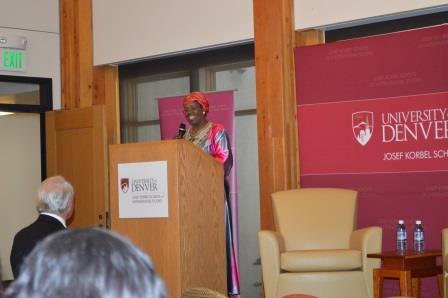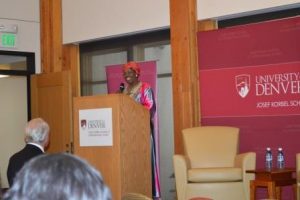Blog
AU Ambassador Espouses “Africa Rising” Narrative During Visit to Denver University


[/media-credit] Ambassador Amina Salum Ali, speaking at University of Denver Korbel School, March 24
With the overall Gross Domestic Product (GDP) of the continent now estimated at about $1.7 trillion, a population of over a billion people, and projected to reach two billion by 2025, the dynamics and cross-connections between its growth and development agenda cannot be underestimated.
Now undertaking a so-called Agenda 2063, the AU’s Permanent Representative to the United States, Ambassador Amina Ali, says the organization’s goals for the next 50 years call for it to be a much stronger institution whose long-term plan is for “one government, one economy and one political system for all of Africa.”
Speaking at the University of Denver (DU) Josef Korbel School of International Studies on March 24, the ambassador said the AU is moving “step-by-step” towards achieving this goal.
While it is currently pursuing a ‘Development Agenda,’ this long-term plan will take some time to achieve, Ali told the audience of students, faculty, and community people gathered at DU’s Sie Center.
A part of the agenda involves what is called the Africa Rising narrative. Contrasting this narrative with a past riddled with conflict and the resolution of ethnic and political strife, today’s Africa, she said, is different because the focus is on economic performance. That economic performance is the main driver behind the new heights that the continent has attained. This new height is real–may have been part of the message she was sending across.
As if to challenge anyone still doubting, Ali stated, “Africa Rising is not just a story, but reality.”
While the facts differ from country to country, the ambassador made a distinction between today’s African continent and the past, and the reasons why the continent is said to be on the rise.
She enumerated many reasons for this — citing leadership changes, a rising middle class, a change in the economic landscape, and fiscal reforms — all of which have led to an attractive environment for economic investment. Foreign Direct Investment (FDI) into Africa is on the rise, she said.
Ali said many African governments today are “democratic, believe in the rule of law and transparency.” She cited the African Peer Review Mechanism(APRM), a tool used by AU member states for self-monitoring and evaluation of each other, as an example.
While there are still risks involved with investing there, the continent remains a good place for business compared to other regions of the world. “It is only in Africa where your return on investment is over 36 percent,” she said.
The continent is doing much better today, according to Ali, because of its purchasing power, increasing service industry, a growing telecommunications industry, as well as growth that are seen in agriculture and urbanization.
“Forty percent of Africa’s GDP comes from people employed and living in urban centers,” she said. “We believe by 20/20, 40 percent of Africa’s GDP will come from people who live in urban centers and who are employed in urban centers.”
On the question of the continent’s human development compared to other regions of the world, Ali said current social indicators support improvements in education, healthcare, and the development of women. She said there are still many areas where improvements are needed. These are the areas where proper policy intervention is needed.
Ali believes the AU’s Agenda 2063 is designed to place special emphasis on young people and women who need the most help. She said the AU is advocating for gender parity in education, even while the goal is far from being realized.
While the continent fell short on the issue of child and maternal mortality vis-à-vis the United Nations (UN) Millennium Development Goals (MDG), ” the question today is what now,” she said.
What does the future hold?
Describing the continent’s economy as “labor-intensive, technology-driven innovation,” the ambassador said education is key to achieving many of the objectives which the AU has set for itself. For this goal to be achieved, the gaps and disparities in the education of women and girls will “need to be bridged,” she said.
On Malaria, Ali revealed that the use of mosquito nets is high in many parts of the continent. Young people, especially that up-to -five years of age are benefiting a lot from this.
On the question of AIDS, Ali said that while there is a decline in transmissions, the continent still has a higher incidence of HIV/AIDS prevalence compared to other regions of the world.
On Ebola, she said many governments around the world were not prepared when the Ebola virus began to spread. “Ebola came as a surprise to Africa governments,” she said. “But we are grateful for the support we got from the Obama administration to take care of Ebola incidences in Africa.”
While everyone was unprepared, many lessons have been learned as a result, she said.
Inter-governmental partnerships have been established, about $30 million in funds were raised, civilian and military resources were mobilized, the private sector got involved, the use of Information Technology (ICT, SMS, etc.) became pervasive as a communications tool as a result.
“Everybody in Africa was involved in eradicating Ebola,” Ali said.
The Dark shadow of Boko Haram
In the almost one-hour-long discussion, the ambassador avoided any mention of Boko Haram, a menace to the international security community. But when asked during a question and answer session about the AU’s role in the prevention of civil strife by Boko Haram in Nigeria, Ali’s response was swift and critical. The bulk of that criticism was directed at the Jonathan administration in Nigeria.
“On many occasions, there were many opportunities when the African Union asked the Nigerian government to seize the moment. We had discussions with Nigeria two years ago, saying the way things are going we have to work together. Somewhere we were assured by the government that things were under control,” she responded.
Essentially, what this translates to is that the AU was asking the Jonathan people to take action and deal with Boko Haram, but that administration failed in its duties.
We now know what happened. Nigeria and the neighboring countries of the Lake Chad region were plunged into chaos by an insurgency that has gone on for months and years.
What are some of the reasons why the Nigerian government failed to act?
Ali believes the Muslim-Christian divide in Nigeria is partly to blame. But she said the AU cannot simply jump in and push the government and start to address this issue. There are also issues with weak institutions, under-development in certain regions, and the lack of access to certain things which are to blame as well, she explained. Fundamentally, the Nigerian government failed in its duties seems to be her response to that question.
“What is missing in Nigeria, unfortunately, I am saying this, is that sense of mission,” she said.
